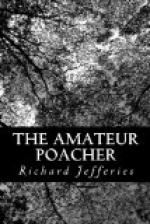What would the shepherd say if I brought home one of his hated enemies no bigger than a rat? The young rabbit made waiting still more painful, being far enough from the hedge to get a clear view into the recess if anything attracted his notice. Why the shepherd hated rabbits was because the sheep would not feed where they had worn their runs in the grass. Not the least movement was possible now—not even that little shifting which makes a position just endurable: the heat seemed to increase; the thought of Ulysses could hardly restrain the almost irresistible desire to stir.
When, suddenly, there was a slight rustling among the boughs of an oak in the other hedge, as of wings against twigs: it was a woodpigeon, better game than a rabbit. He would, I knew, first look round before he settled himself to preen his feathers on the branch, and, if everything was still while that keen inspection lasted, would never notice me. This is their habit—and the closer you are underneath them the less chance of their perceiving you: for a pigeon perched rarely looks straight downwards. If flying, it is just the reverse; for then they seem to see under them quicker than in any other direction.
Slowly lifting the long barrel of the gun—it was fortunate the sunlight glancing on the bright barrel was not reflected towards the oak—I got it to bear upon the bird; but then came a doubt. It was all eight-and-twenty yards across the angle of the meadow to the oak—a tremendous long shot under the circumstances. For they would not trust us with the large copper powder-flask, but only with a little pistol-flask (it had belonged to the pair of pistols we tried to find), and we were ordered not to use more than a charge and a half at a time. That was quite enough to kill blackbirds. (The noise of the report was always a check in this way; such a trifle of powder only made a slight puff.)
Shot there was in plenty—a whole tobacco-pipe bowl full, carefully measured out of the old yellow canvas money-bag that did for a shot belt. A starling could be knocked off the chimney with this charge easily, and so could a blackbird roosting in a bush at night. But a woodpigeon nearly thirty yards distant was another matter; for the old folk (and the birdkeepers too) said that their quills were so hard the shot would glance aside unless it came with great force. Very likely the pigeon would escape, and all the rabbits in the buries would be too frightened to come out at all.
A beautiful bird he was on the bough, perched well in view and clearly defined against the sky behind; and my eye travelled along the groove on the breech and up the barrel, and so to the sight and across to him; and the finger, which always would keep time with the eye, pulled at the trigger.
A mere puff of a report, and then a desperate fluttering in the tree and a cloud of white feathers floating above the hedge, and a heavy fall among the bushes. He was down, and Orion’s spaniel (that came racing like mad from the rickyard the instant he heard the discharge) had him in a moment. Orion followed quickly. Then the shepherd came up, rather stiff on his legs from rheumatism, and stepped the distance, declaring it was thirty yards good; after which we all walked home in triumph.




